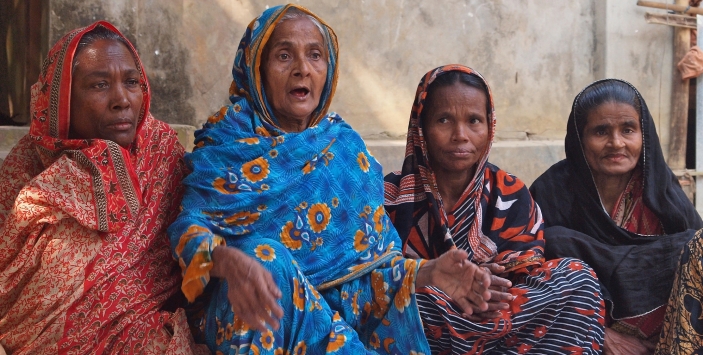 “I remember telling my family how my sight was becoming blurry, until one day everything was dark and I could not see a thing”, said Nyabel, a 60-year-old woman who developed cataracts after she fled to Ethiopia from South Sudan.
“I remember telling my family how my sight was becoming blurry, until one day everything was dark and I could not see a thing”, said Nyabel, a 60-year-old woman who developed cataracts after she fled to Ethiopia from South Sudan.
“I lost my independence. Gradually, my life became harder and harder. I felt very sad and there was nothing I, nor anyone else, could do to change that.”
Nyabel moved in with her oldest daughter and her family, relying on them for everything, even bathing. She spent years without her sight or her independence until HelpAge International’s eye care team visited her refugee camp and performed routine cataract surgery.
The marginalisation of older women
The problems Nyabel faced aren’t uncommon. Women are at greater risk of developing cataracts than men and are less likely to have access to services. It’s a pattern repeated throughout the world, as women face more problems in getting the health care they need, exacerbated by gender-based disparities in income and employment.
Nearly a quarter of the world’s women are 50 and over, according to UN DESA. And as the global population ages, this will only increase, making the need to challenge discrimination and the barriers women face all the more pressing.
One of the biggest problems is the lack of information on rights. Data on physical and sexual violence against women usually stops at age 49, effectively excluding a quarter of the world’s women.
In a joint WHO-UN report surveying 133 countries, only 17% reported having data on elder abuse and of the 59% that have laws to prevent elder abuse, less than a third said these were fully enforced.
Why are older women’s rights not respected?
When abuse occurs, countries are often ill-equipped to deal with it. A 2013 UN report found that that older women are often excluded from laws on domestic violence and that greater understanding of the neglect, abuse and violence they experience is needed.
The unpaid care that older women provide is as unrecognised in older age as it is at other stages of their lives. The care provided for their husbands, for other older relatives, for their daughters through pregnancy and infant care, and for their grandchildren, is taken for granted in most societies.
Despite this, many development programmes and healthcare systems don’t involve older women or fulfil their rights.
While a simple operation allowed Nyabel to see again, many older women never receive the treatment they need. It may not be available, it may be too expensive and sometimes they may even be turned away, being told they are not ill but just old.
The impact on older women and how we can make a difference
Left untreated, chronic illnesses and other impairments can have a devastating and debilitating impact on older women’s lives and their ability to contribute to their families and the communities they live in. They can lose their independence and autonomy, and become dependent on family members for support, many of whom are ill-equipped to cope.
Older women know best what will improve their lives and any effective approach to “promote wellbeing for all at all ages” must put them at the forefront.
At HelpAge, we see passionate activists every day, tirelessly campaigning for the rights of older people and putting to shame the lazy stereotypes people in their later years face.
Movements to end ageism and sexism mustn’t ignore the intersecting forms of discrimination older women can be subjected to. By valuing their contributions and learning from their experiences we help ensure that these campaigns for equality are as inclusive as possible.
